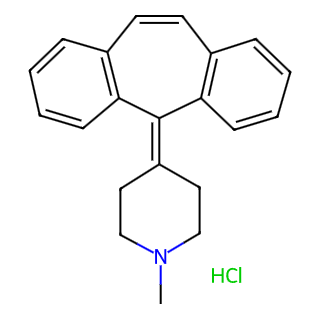- Synthetic anti-infective drugs
- Medications for the digestive system
- Antipyretic and analgesic drugs
- Medications for the blood system
- Medications for the respiratory system
- Anti-allergic drugs
- Medications for the urinary system
- Diagnostic medications
- Immunosuppressive and immunomodulatory drugs
- Vitamins and mineral supplements
- Antioxidants and medications for osteoporosis
- Antiparasitic drugs
- Ophthalmic medications
- Amino acids and their derivatives
- Dermatological medications
- Medications for the circulatory system
- Antitumor drugs
- Medications for the nervous system
- Hormonal and endocrine function-regulating drugs
- Antibiotics
- Others
CAS No.: 969-33-5




Cyproheptadine Hydrochloride
Cyproheptadine Hydrochloride is a hexahydropyridine-class antihistamine with a broad range of medical applications and pharmacological properties.
Basic Information
CAS Number: 969-33-5
Molecular Formula: C21H21NCl
Molecular Weight: 323.86
English Name: Cyproheptadine Hydrochloride
Pharmacological Actions
Antihistamine Effect: Cyproheptadine Hydrochloride possesses potent H1 receptor antagonism, competing with histamine released from tissues for binding to H1 receptors on effector cells, thereby preventing the onset of allergic reactions and alleviating histamine-induced spasms and congestion. Its antihistaminic potency is stronger than that of chlorpheniramine and promethazine.
Antiserotonin Effect: It exhibits mild to moderate antiserotonin activity.
Anticholinergic Effect: It possesses some anticholinergic properties.
Other Effects: It can stimulate appetite, leading to weight gain with prolonged use. Additionally, it has antidepressant and anti-serotonin effects, as well as antiplatelet activity, which has been studied in the context of thromboembolic diseases.
Clinical Uses
Primarily used in the treatment of acute and chronic urticaria (especially effective for cold urticaria), papular urticaria, angioedema, allergic eczema, contact dermatitis, food allergies, drug allergies, allergic rhinitis, hay fever, allergic conjunctivitis, insect bite allergies, and migraine headaches.
It also has a therapeutic role in bronchial asthma.
Used as an adjunctive therapy in Cushing's syndrome and acromegaly.
As an appetite stimulant in patients with psychogenic anorexia.
Reported to treat acanthosis nigricans and prevent necrotizing fasciitis.

Tai Yau Street, San Po Kong, Kowloon, Hong Kong, China.



